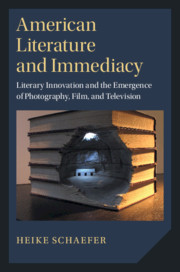 American Literature and Immediacy
American Literature and Immediacy Book contents
- American Literature and Immediacy
- Cambridge Studies in American Literature and Culture
- American Literature and Immediacy
- Copyright page
- Dedication
- Contents
- Acknowledgements
- The Quest for Immediacy in American Literature and Media Culture
- Part I Literary Immediacy and Photography
- Part II Literary Immediacy and the Cinema
- Part III Literary Immediacy and Television
- Chapter 7 Being There: Television’s Aesthetics of Immediacy
- Chapter 8 For Real? The Critique of TV Culture in the Short Fiction of Robert Coover and David Foster Wallace
- Chapter 9 “Nothing Happens Until It Is Consumed”: The Remediation of TV Images in Don DeLillo’s Novel Mao II
- Chapter 10 Fiction in the Age of Television
- Still in Pursuit
- Notes
- Bibliography
- Index
- Series page
Chapter 10 - Fiction in the Age of Television
from Part III - Literary Immediacy and Television
Published online by Cambridge University Press: 19 December 2019
- American Literature and Immediacy
- Cambridge Studies in American Literature and Culture
- American Literature and Immediacy
- Copyright page
- Dedication
- Contents
- Acknowledgements
- The Quest for Immediacy in American Literature and Media Culture
- Part I Literary Immediacy and Photography
- Part II Literary Immediacy and the Cinema
- Part III Literary Immediacy and Television
- Chapter 7 Being There: Television’s Aesthetics of Immediacy
- Chapter 8 For Real? The Critique of TV Culture in the Short Fiction of Robert Coover and David Foster Wallace
- Chapter 9 “Nothing Happens Until It Is Consumed”: The Remediation of TV Images in Don DeLillo’s Novel Mao II
- Chapter 10 Fiction in the Age of Television
- Still in Pursuit
- Notes
- Bibliography
- Index
- Series page
Summary
Taking its cue from Raymond Federman’s programmatically titled essay “The Last Stand of Literature,” the chapter briefly reviews the critical debate about the increasing convergence of literary and television culture. Rather than seeing the influx of TV aesthetics into American literature as causing a demise of literary culture, the chapter argues that the texts by Coover, Wallace, and DeLillo imaginatively reframe TV culture and turn the reflection on visual media into a source of literary innovation. They acknowledge TV as a central force in postmodern culture, rework televisual immediacy effects, and describe TV images and their reception, but they do so in self-reflexive narratives that probe the contributions literature can make to a culture shaped by TV and the commodification of art and experience.
Keywords
- Type
- Chapter
- Information
- American Literature and ImmediacyLiterary Innovation and the Emergence of Photography, Film, and Television, pp. 234 - 237Publisher: Cambridge University PressPrint publication year: 2020
